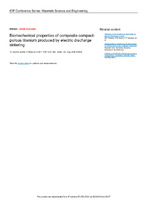| dc.contributor.author | Minko, D. | |
| dc.contributor.author | Belyavin, K. | |
| dc.contributor.author | Sheleg, V. | |
| dc.date.accessioned | 2018-03-15T16:03:17Z | |
| dc.date.available | 2018-03-15T16:03:17Z | |
| dc.date.issued | 2017 | |
| dc.identifier.citation | Minko, D. Biomechanical properties of composite compact-porous titanium produced by electric discharge sintering / D. Minko, K. Belyavin, V. Sheleg // 5th International Scientific Workshop On Advanced Technologies Of Materials Field-Assisted Consolidation. – 2017. – Vol. 218, № 012008. – (IOP Conference Series-Materials Science and Engineering) – DOI: 10.1088/1757-899X/218/1/012008. | en |
| dc.identifier.uri | https://rep.bntu.by/handle/data/38758 | |
| dc.description.abstract | The main disadvantage of currently used endosteal implants is their unsatisfactory biostable performance. Under action of functional stress caused by flaws of the design or lower mechanical characteristics the areas of stresses extreme concentration exceeding strength limits of bone tissue appears in the bone surrounding the implant that leads to the tearing away the implant. The problem of specific pressure lowering on the bone and uniform distribution of stress is solved by two ways: the increase of the implant area and the search of implant materials with optimum biomechanical properties. Porous materials of spherical titanium powders have adjustable pore size and large unit surface area, as well as possess high biologic compatibility with living tissue. This allows reduction of the rejection reaction due to a more even stress distribution around the functioning implant. Clinical results show that such implants have more stable physical and chemical properties. | en |
| dc.language.iso | en | en |
| dc.title | Biomechanical properties of composite compact-porous titanium produced by electric discharge sintering | en |
| dc.type | Article | ru |
| dc.identifier.doi | DOI: 10.1088/1757-899X/218/1/012008 | |

